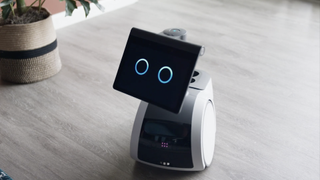Amazon Astro called 'privacy nightmare' and 'terrible' — here's why
Former employees aren’t so hot on Amazon’s Astro robot, and Amazon has responded

The Amazon Astro robot is designed to “give peace of mind” to its owners by patrolling their homes and alerting them should anything out of the ordinary occur. It sounds like a revolutionary leap forward in home surveillance technology but it's also been described as a “privacy nightmare” and “terrible” by those who reportedly worked on the project.
Internal documents obtained by Vice, outline how Amazon’s Astro robot is designed to monitor activity within a home and report any suspicious activities or unwelcome strangers to the residents. After purchasing the $999 robot, the owner will “enroll” their face and voice, as well as the face and voice of anyone else who lives at or regularly visits the home, and then set it loose to roam.
- Everything we know about Amazon Astro
- The best smart home devices right now
- Plus: Up to 10 million Android users hit by money-stealing malware — what to do
From there the Astro robot will regularly patrol its owner’s home and identify each person it encounters. If they’ve been scanned into its memory, it’ll leave them alone; if not, Astro will follow the unrecognized person and begin recording them for good measure. The robot can also detect “out of the ordinary” noises with examples like glass breaking or a fire alarm given in the documents.
Astro can be placed in an “Away mode” for when the owner is not home. This mode will see Astro continue to patrol the home, and give the owner remote access to a livestream of what it's seeing. You can even start a video call through the robot, if you need to communicate with your house-sitter for example. That’s definitely one way to get peace of mind when you’re on vacation or a business trip.
On paper, the Astro robot sounds like a useful piece of surveillance technology but former Amazon employees are less than complimentary about its abilities. One unnamed source who worked on the project told Vice, “Astro is terrible and will almost certainly throw itself down a flight of stairs if presented the opportunity. The person detection is unreliable at best, making the in-home security proposition laughable."
The source also states that Astro feels fragile for such an expensive piece of equipment and notes that Amazon’s claims of it being an accessibility device are “at best, absurdist nonsense and marketing and, at worst, potentially dangerous for anyone who'd actually rely on it for accessibility purposes.”
It’s not just the robot’s abilities to perform its primary functions that former employees are questioning. Another said, “It's a privacy nightmare that is an indictment of our society and how we trade privacy for convenience with devices like [Astro]." Adding “as for my personal opinions on the device, it's a disaster that's not ready for release.”
Sign up to get the BEST of Tom’s Guide direct to your inbox.
Upgrade your life with a daily dose of the biggest tech news, lifestyle hacks and our curated analysis. Be the first to know about cutting-edge gadgets and the hottest deals.
Astro’s facial recognition abilities being called into question is rather worrying considering the robot’s primary function is to patrol a home and determine disturbances and strangers. That’s before touching on the understandable privacy concerns that come with allowing Amazon access to a roving camera in your home at all times.
Amazon responds to Astro criticism
In defense of its latest product, Amazon has released a blog post detailing how the visual ID feature works, and a representative for the retailer responded to Vice's request for comment.
Kristy Schmidt, a senior PR manager at Amazon, said, "in addition to consulting with several Amazon Scholars who specialize in computer vision, we also consulted with an external expert in algorithmic bias, Ayanna Howard, dean of the Ohio State University College of Engineering, to review the steps we took to enhance the fairness of this feature."
Schmidt also provided a comment from Dr. Howard, who explained that Amazon has been extremely thorough in the designing and testing of Astro's visual ID features. Adding that the company has made "a genuine effort to ensure the feature not only works statistically well for all their customers, but that it also continues to get better over time on behalf of those customers."
With all this in mind, there are definitely reasons to be excited about Astro robot, as it does appear to be a fairly cutting-edge piece of technology. However, the concerns of those who worked on the project could give prospective buyers pause.

Rory is an Entertainment Editor at Tom’s Guide based in the UK. He covers a wide range of topics but with a particular focus on gaming and streaming. When he’s not reviewing the latest games, searching for hidden gems on Netflix, or writing hot takes on new gaming hardware, TV shows and movies, he can be found attending music festivals and getting far too emotionally invested in his favorite football team.
